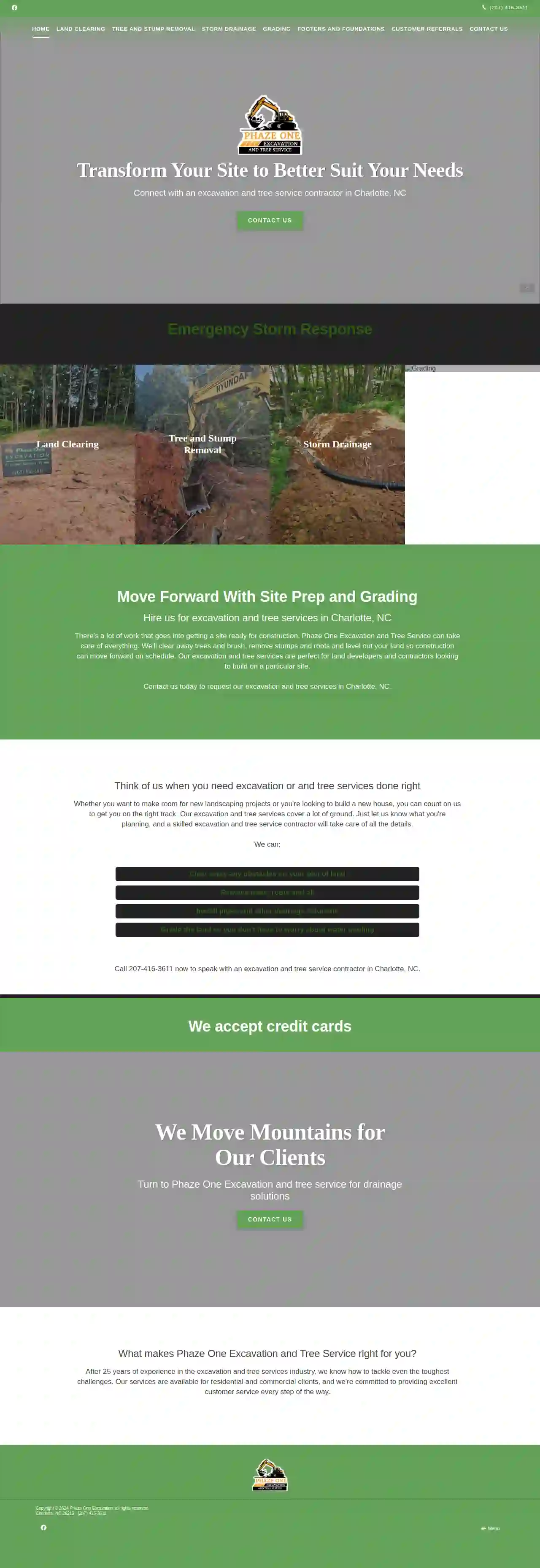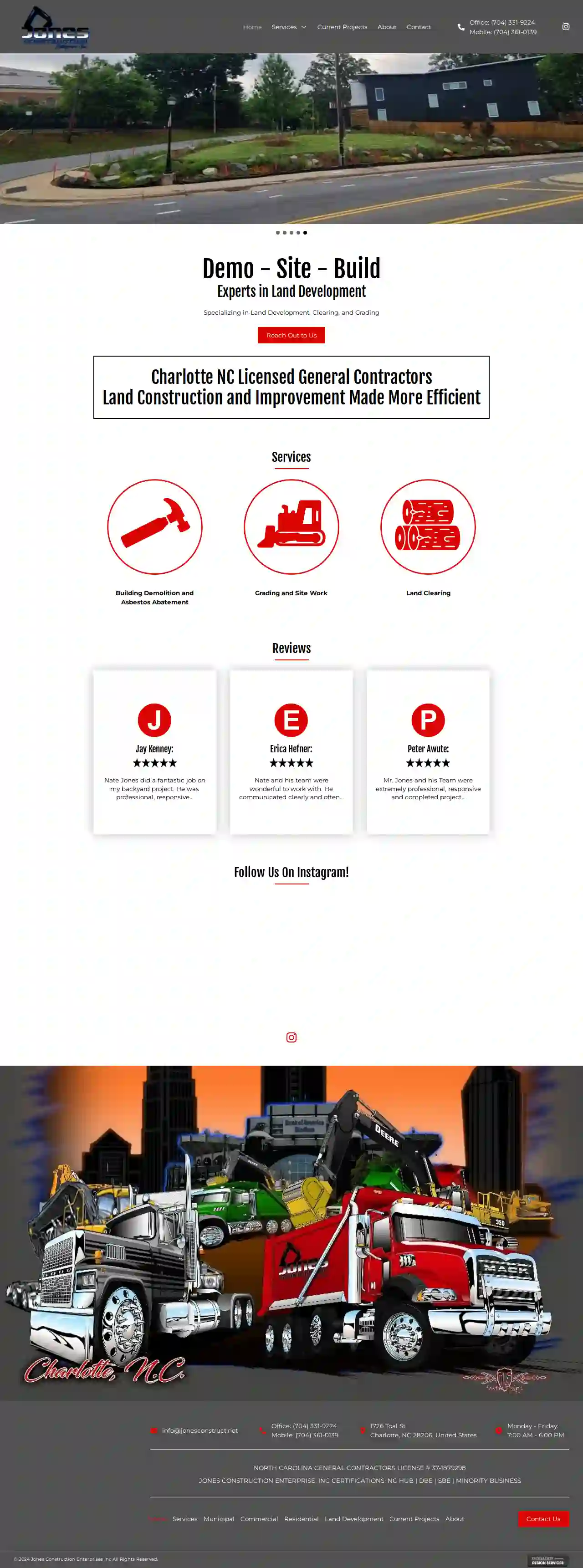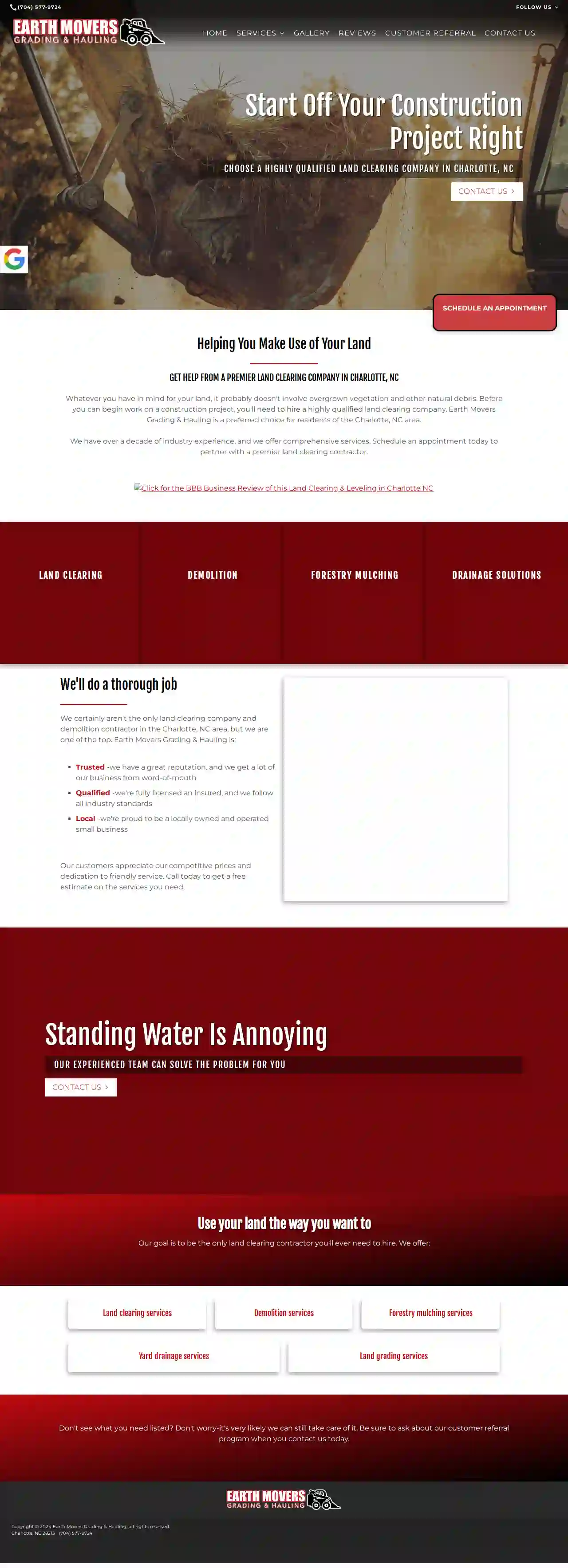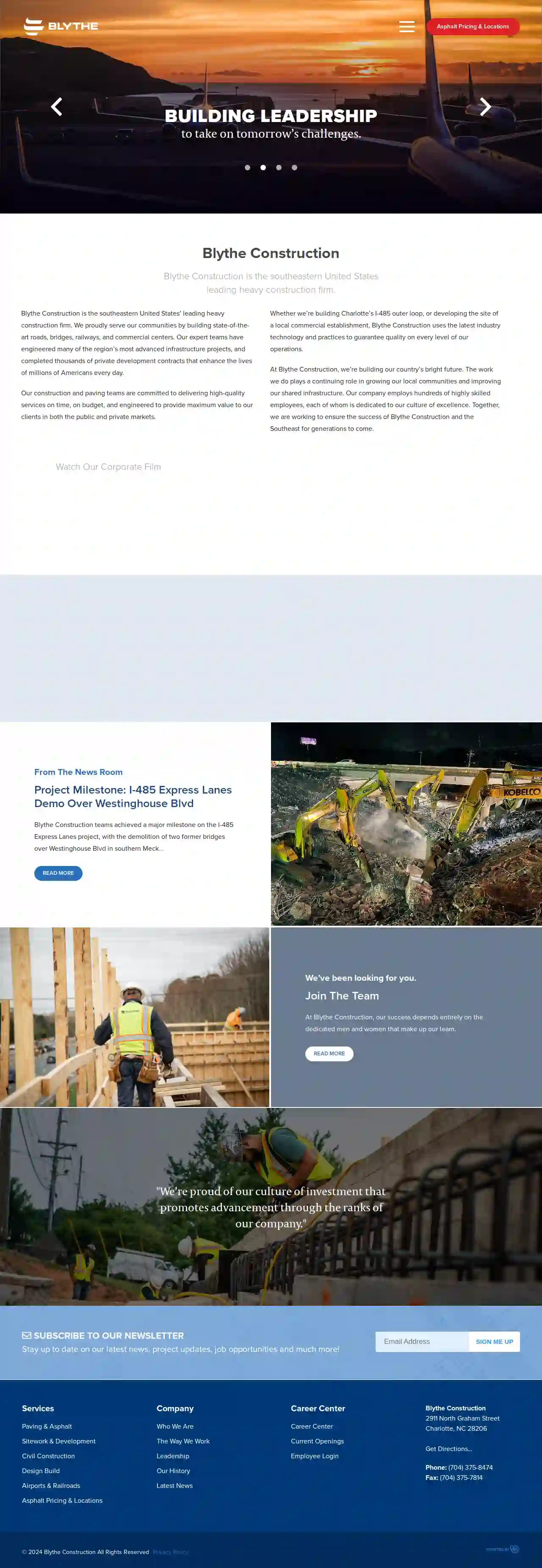Excavation Contractors Charlotte
Find top Excavation Services in Charlotte
Get up to 3 Excavation Contractor quotes for your project today! Compare profiles, reviews, accreditations, portfolio, etc... and choose the best offer.

Phaze One Excavation
54 reviewsCharlotte, 28213, USTransform Your Site to Better Suit Your Needs Connect with an excavation and tree service contractor in Charlotte, NC There's a lot of work that goes into getting a site ready for construction. Phaze One Excavation and Tree Service can take care of everything. We'll clear away trees and brush, remove stumps and roots and level out your land so construction can move forward on schedule. Our excavation and tree services are perfect for land developers and contractors looking to build on a particular site. Contact us today to request our excavation and tree services in Charlotte, NC. Whether you want to make room for new landscaping projects or you're looking to build a new house, you can count on us to get you on the right track. Our excavation and tree services cover a lot of ground. Just let us know what you're planning, and a skilled excavation and tree service contractor will take care of all the details. We can: Clear away any obstacles on your plot of land Remove trees, roots and all Install pipes and other drainage solutions Grade the land so you don't have to worry about water pooling Call 207-416-3611 now to speak with an excavation and tree service contractor in Charlotte, NC. After 25 years of experience in the excavation and tree services industry, we know how to tackle even the toughest challenges. Our services are available for residential and commercial clients, and we're committed to providing excellent customer service every step of the way.
- Services
- Why Us?
- Gallery
Get Quote
Jones Construction Enterprise's, Inc
4.964 reviews1726 Toal St, Charlotte, 28206, USHire Our Land Developers for Your Next Construction Project Jones Construction Enterprises, Inc. is a full-service construction company specializing in land development, residential, commercial, and municipal projects. We are committed to providing our clients with the highest quality construction services at competitive prices. Our team of experienced professionals is dedicated to delivering projects on time and within budget. We are proud to be a minority-owned business and are committed to providing opportunities for all. Learn More Get a Quote
- Services
- Why Us?
- Gallery
Get Quote
Earth Movers Grading & Hauling LLC
56 reviewsCharlotte, US- Services
- Why Us?
Get Quote
Blythe Construction Inc
3.444 reviewsCharlotte, US- Services
- Why Us?
Get Quote
Over 3,943+ Excavation Companies onboarded
Our excavation companies operate in Charlotte & surroundings!
ExcavationHQ has curated and vetted the Best Excavation Contractors in Charlotte. Find a top & trustworthy business today.
Frequently Asked Questions About Excavation Contractors
- Soil Type and Stability: Stable, cohesive soils allow for deeper excavations than loose or unstable soils.
- Groundwater Level: Excavations below the water table require dewatering techniques to manage water intrusion.
- Equipment and Resources: The size and capabilities of excavation equipment influence the achievable depth.
- Safety Regulations: OSHA and other safety regulations impose limitations on trench depths without proper shoring or sloping.
- Project Requirements: The purpose of the excavation (basement, pool, foundation) determines the necessary depth.
- Project Size and Scope: The larger and more complex the excavation, the higher the cost.
- Soil Type: Different soil types require different equipment and techniques, impacting costs. Rocky or clay-rich soil can be more expensive to excavate than loose soil.
- Accessibility: Difficult-to-access sites might require specialized equipment or additional labor, increasing expenses.
- Disposal Costs: Hauling away excavated material (soil, rocks, etc.) to disposal sites incurs additional fees.
- Permits and Inspections: Depending on local regulations, permits and inspections might be required, adding to the overall cost.
- Utility Locates: Contact your utility companies to mark the locations of underground lines before excavation begins. This is usually a free service.
- Hand Digging: Excavate carefully by hand near marked utility lines to avoid damage.
- Potholing: Digging small test holes to expose and verify utility depths and locations.
- Safe Distances: Maintaining a safe distance between excavation equipment and marked utility lines.
- Vacuum Excavation: Using vacuum excavation techniques to expose utilities without digging, reducing the risk of damage.
- Trench Collapses: Unstable trench walls can cave in, posing a severe risk to workers. Proper shoring and sloping are crucial safety measures.
- Utility Damage: Striking underground utilities (gas, water, electric) can cause leaks, explosions, or electrocution. Accurate utility locates and careful digging are essential.
- Falling Objects: Materials or equipment falling into excavations can injure workers. Securing work areas and using appropriate safety gear is vital.
- Equipment Accidents: Operating heavy machinery involves risks of rollovers, collisions, or mechanical failures. Trained operators and proper equipment maintenance are critical.
- Environmental Hazards: Excavated soil might contain hazardous materials (asbestos, lead). Proper testing and disposal procedures are necessary.
How deep can you excavate?
How much does excavation cost?
How do you protect utilities during excavation?
What are the risks associated with excavation?
How deep can you excavate?
- Soil Type and Stability: Stable, cohesive soils allow for deeper excavations than loose or unstable soils.
- Groundwater Level: Excavations below the water table require dewatering techniques to manage water intrusion.
- Equipment and Resources: The size and capabilities of excavation equipment influence the achievable depth.
- Safety Regulations: OSHA and other safety regulations impose limitations on trench depths without proper shoring or sloping.
- Project Requirements: The purpose of the excavation (basement, pool, foundation) determines the necessary depth.
How much does excavation cost?
- Project Size and Scope: The larger and more complex the excavation, the higher the cost.
- Soil Type: Different soil types require different equipment and techniques, impacting costs. Rocky or clay-rich soil can be more expensive to excavate than loose soil.
- Accessibility: Difficult-to-access sites might require specialized equipment or additional labor, increasing expenses.
- Disposal Costs: Hauling away excavated material (soil, rocks, etc.) to disposal sites incurs additional fees.
- Permits and Inspections: Depending on local regulations, permits and inspections might be required, adding to the overall cost.
How do you protect utilities during excavation?
- Utility Locates: Contact your utility companies to mark the locations of underground lines before excavation begins. This is usually a free service.
- Hand Digging: Excavate carefully by hand near marked utility lines to avoid damage.
- Potholing: Digging small test holes to expose and verify utility depths and locations.
- Safe Distances: Maintaining a safe distance between excavation equipment and marked utility lines.
- Vacuum Excavation: Using vacuum excavation techniques to expose utilities without digging, reducing the risk of damage.
What are the risks associated with excavation?
- Trench Collapses: Unstable trench walls can cave in, posing a severe risk to workers. Proper shoring and sloping are crucial safety measures.
- Utility Damage: Striking underground utilities (gas, water, electric) can cause leaks, explosions, or electrocution. Accurate utility locates and careful digging are essential.
- Falling Objects: Materials or equipment falling into excavations can injure workers. Securing work areas and using appropriate safety gear is vital.
- Equipment Accidents: Operating heavy machinery involves risks of rollovers, collisions, or mechanical failures. Trained operators and proper equipment maintenance are critical.
- Environmental Hazards: Excavated soil might contain hazardous materials (asbestos, lead). Proper testing and disposal procedures are necessary.